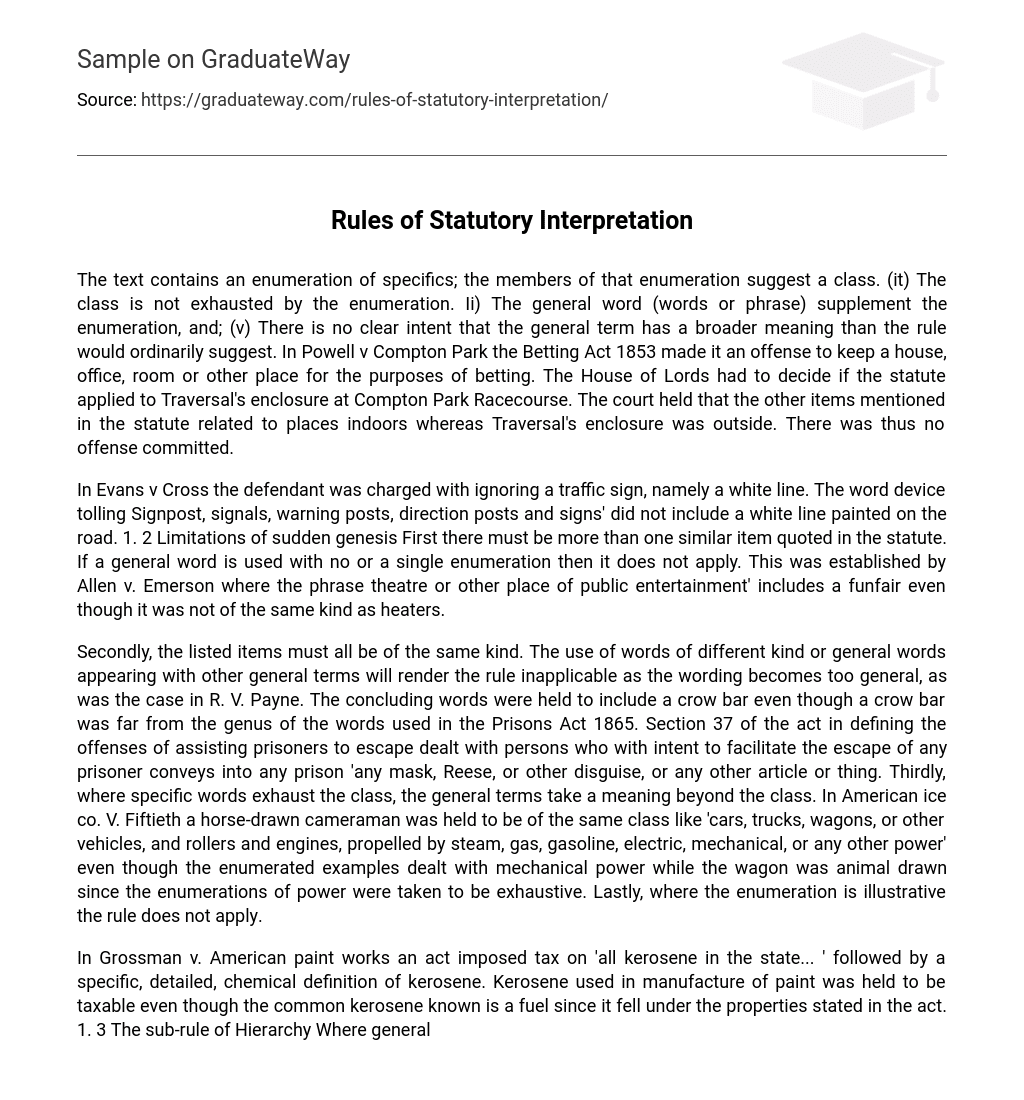The text contains an enumeration of specifics; the members of that enumeration suggest a class. (it) The class is not exhausted by the enumeration. Ii) The general word (words or phrase) supplement the enumeration, and; (v) There is no clear intent that the general term has a broader meaning than the rule would ordinarily suggest. In Powell v Compton Park the Betting Act 1853 made it an offense to keep a house, office, room or other place for the purposes of betting. The House of Lords had to decide if the statute applied to Traversal’s enclosure at Compton Park Racecourse. The court held that the other items mentioned in the statute related to places indoors whereas Traversal’s enclosure was outside. There was thus no offense committed.
In Evans v Cross the defendant was charged with ignoring a traffic sign, namely a white line. The word device tolling Signpost, signals, warning posts, direction posts and signs’ did not include a white line painted on the road. 1. 2 Limitations of sudden genesis First there must be more than one similar item quoted in the statute. If a general word is used with no or a single enumeration then it does not apply. This was established by Allen v. Emerson where the phrase theatre or other place of public entertainment’ includes a funfair even though it was not of the same kind as heaters.
Secondly, the listed items must all be of the same kind. The use of words of different kind or general words appearing with other general terms will render the rule inapplicable as the wording becomes too general, as was the case in R. V. Payne. The concluding words were held to include a crow bar even though a crow bar was far from the genus of the words used in the Prisons Act 1865. Section 37 of the act in defining the offenses of assisting prisoners to escape dealt with persons who with intent to facilitate the escape of any prisoner conveys into any prison ‘any mask, Reese, or other disguise, or any other article or thing. Thirdly, where specific words exhaust the class, the general terms take a meaning beyond the class. In American ice co. V. Fiftieth a horse-drawn cameraman was held to be of the same class like ‘cars, trucks, wagons, or other vehicles, and rollers and engines, propelled by steam, gas, gasoline, electric, mechanical, or any other power’ even though the enumerated examples dealt with mechanical power while the wagon was animal drawn since the enumerations of power were taken to be exhaustive. Lastly, where the enumeration is illustrative the rule does not apply.
In Grossman v. American paint works an act imposed tax on ‘all kerosene in the state… ‘ followed by a specific, detailed, chemical definition of kerosene. Kerosene used in manufacture of paint was held to be taxable even though the common kerosene known is a fuel since it fell under the properties stated in the act. 1. 3 The sub-rule of Hierarchy Where general words are Joined to specific words, the general words do not include things in a class superior (in importance or value) to the enumerated things.
This is because when listing things the court assumes that things of ‘higher’ order are assassinated first and if not mentioned they are to be excluded. A statute listing, ‘copper, brass, pewter and tin, and all other metals’ was held not applicable to gold and silver. Literally institutor a socio is the company it keeps’. Hence, in Dept. Of Health v. Sol Schnook Dress poultry court have for long held that, the coupling of words denotes an intention that they be understood in the same general sense. ‘ The rule is usually applied where several words are grouped together and the meaning of one of the words is disputed or unclear. . 1 Application For this rule to apply the following conditions have to apply.





